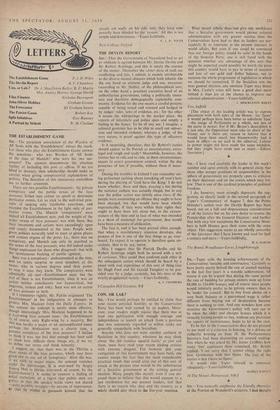The Establishment Game P. J. D. Wiles The Devlin Report
. A. 1'. Chambers Con, or Lab.? Dr. J. Shael,le ton Bailey, R. E. Martin Mrs. Audrey Harvey, George Sheriff Film Finance Nicholas. Davenport John Oliver Hobbes Graham Greene The Forecaster Sir Graham Sutton The Patriot Game Robert Kee Split Infinitives Guy Ramsay A Portrait by Sickert N. M. Clothier
THE ESTABLISHMENT GAME
SIR; --The persistent association of the Warden of All Souls with the 'Establishment' misses the mark. Let those who play the Establishment Game answer. the questions: who was Warden of All Souls at the time of Munich? who were his two suc- cessors'? The answers demonstrate the absolute futility of including this post ex officio. If we are blind to decency, then scholarship should make us careful when giving conspiratorial explanations of politics. The detection of this inaccuracy emboldens me to further comment.
There are two possible Establishments : the private conspiracy and the public nexus of the Bien peasants. Either may colour an epoch or determine particular events. Let us stick to the well-tried prin- ciple of making only falsifiable assertions, and examine the Establishment in the light only of par- ticular events. The Munich 'conspirators' were indeed all Establishment men, and the weight of the wider 'nexus of Bien peasants' was with them. But their intentions and actions were exceedingly open and amply documented at the time. People with given policies naturally tend to meet at given places and contact organs of the press. I.e., there' was no conspiracy, and Munich can only be ascribed to the nexus of the Bien peasants, who did indeed make things unpleasant for those who disagreed—but with the spontaneous backing of public opinion, Suez was a conspiracy: undocumented at the time, and an entire surprise to most members of, the nexus, who in various degrees used their power to stop it once they knew. The conspirators were admittedly all—just—Establishment men; but the feel of Suez is not Establishment, since it was an action neither conciliatory nor hypocritical, but Jingoistic, violent and risky. Suez was not an action of bien peasants as such. If I remember rightly, Mr. Fairlie originated The Establishment' in his indignation at attempts to protect Mrs. Maclean from the Daily Express. In this context the concept is surely most effective, though interestingly Mrs. Maclean happened to. be 1t Left-wing hien peasant issue: the Establishment 1s,, of course, only Right-wing by a majority. But Ink was hardly a major or an uncomplicated issue; perhaps the Abdication was a clearer case, a genuine conspiracy of the hien peasants? I incline to think it was, but feel that enough 'has been said to show how difficult these things are, if we try to define our terms and think honestly. I suggest, sir, that there was in the Thirties a close nexus of the Bien peasants, which may have given rise to one act of 'conspiracy.' After the war, if we stick to major issues, the concept vanishes under the microscope. It is over-used by Angry Young Men (a phrase over-used, of course, by the Establishment!). It seems to connote a feeling of social exclusion; or a regret that public men are Polite; or that the speaker holds views not shared — quite possibly wrongly—by anyone of importance; or that he wishes to persuade himself that the people are really on hiS side, only they have. tem- porarily been blinded by- the 'system.' All this is too simple and determinate.—Yours faithfully,
New College, Oxford P. J. D. WILES


































 Previous page
Previous page